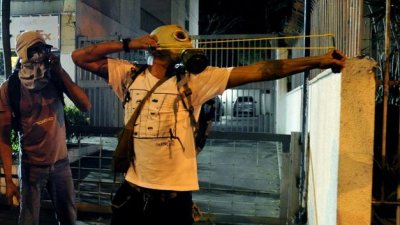Washington continues its destabilizing moves against governments that are not its cup of tea, and, very often, a pattern emerges. Interviewed by the Algerian newspaper El Watan, the French researcher, Salim Lamrani, observes that recent violence in Venezuela leave a deep impression, already witnessed before.

El Watan : In your view, what would be the real significance of the student protests in terms of representativeness and the mobilisation?
Salim Lamrani : The current demonstrations in Venezuela are a disturbing reminder of the events of April 2002 that triggered a coup d’etat against the democratically elected government of President Hugo Chavez.
We recall that in 2002, similar protests organized by the Venezuelan Right had claimed several victims both among government supporters and its detractors.
We all know what happened next: part of the army in collusion with private media in the country and the radical opposition broke the constitutional order and imposes a dictatorship that thankfully, due to the massive mobilization of people, only lasted 48 hours.
We must not shield our eyes from the fact that, behind these students – who are far from representative of the country’s entire student body – lurks the opposition: anti-democratic, coup-thirsty, backed politically and financially by the United States which has always refused to accept popular will since 1998.
The goal is to destabilize the country in order to justify the next step: the use of force against the country. Given that, since 1998, the Venezuelan Right has been unable to seize power democratically, it is opting for violence.
El Watan : To what extent is the democratic aspiration of student protest that demonstrate in the streets of Caracas against « the high cost of living and insecurity» legitimate? Are we heading to a new clash between the liberal opposition – that in this case uses young intermediaries – and the Chavistas accused of « absolutism»?
Salim Lamrani : No government in the history of Latin American has had as much democratic legitimacy as Hugo Chavez, who won 16 out of 17 elections in 15 years. However, the Western Media massively criticized him and caricaturized him in a manner that in no way reflected what the Bolivarian process was really about.
It seems to me that one of the biggest failures of Western journalism is the way it has characterized the Bolivarian Revolution.
The election of the current president, Nicolás Maduro, was the outcome of a democratic election, recognized by the most eminent international institutions, from the European Union to the Organization of American States and the Carter Centre.
Since his arrival to power in April 2013, there have been two elections and Maduro emerged victorious from them, with total transparency.
Instability and the high cost of living are pretexts to justify violent acts. It is curious to note that the rate of criminality is the highest in states governed by the opposition.
As for the high cost of living, this is largely due to speculators that amass essential products in order to artificially create shortfalls. The authorities have taken active measures to fight against these downward spirals that constitute serious crimes. « Absolutism » in Venezuela, a country where 80% of the media is privately owned and where the opposition controls large sectors of the economy, cannot be seriously spoken about.
El Watan: Is Venezuela in the process of living the Latin-American Spring or is it the umpteenth episode of what one calls the « Cold War 2.0» ? What would be the real role of the United States in events that are shaking Venezuela?
Salim Lamrani : Venezuelan democracy is in great danger due to violent and subversive oppositional activities. Power is won by votes not crime.
The United States is playing a major role in destabilizing Venezuela. This country is the world’s fifth largest oil producer. When Chavez came to power, he enabled the Venezuelan nation to recover its political, economic and energy sovereignty. Thereafter, national riches are channelled to the masses and not only to US multinationals and the country’s oil oligarchies.
El Watan : Has the political division that characterizes Venezuela from the time Chavez came to power, ended up by splitting the Venezuelan youth in two camps that clash due to antagonist notions of the «revolution» ?
Salim Lamrani : No Venezuelan government has done as much for the youth of this country as the governments of Hugo Chavez and Nicolas Maduro, be it in terms of education, health or access to culture and hobbies. The demonstrations of certain students – the vast bulk of which are from the country’s wealthy classes – do not represent the entire university body. Before the Bolivarian Revolution, 80% of the population neither had a voice or a vote.
El Watan : How do you imagine the future? It there a risk of stalemate towards a situation of security instability in the region?
Salim Lamrani: Latin America in its entirety has condemned the violence in Venezuela and rejects the opposition’s attempts at a coup. The institutions are robust in Venezuela and the leaders have 15 years experience in the struggle against subversion. In any event, Latin America will never accept another 11 April 2002 (the coup d’Etat against Chávez).

 Articles by this author
Articles by this author Send a message
Send a message
















Stay In Touch
Follow us on social networks
Subscribe to weekly newsletter